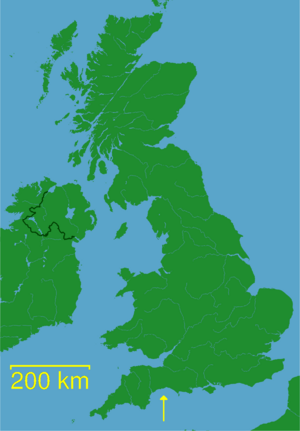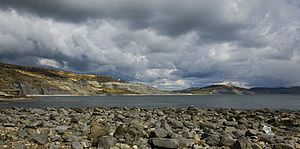Lyme Bay facts for kids
Lyme Bay is a large area of the English Channel located off the south coast of England. It stretches from Start Point in the west to Portland Bill in the east. The counties of Devon and Dorset are along its coastline.
Contents
Geology and the Jurassic Coast
The eastern part of Lyme Bay is famous for being part of the Jurassic Coast. This area is a World Heritage Site because of its amazing geology. It's called the Jurassic Coast because you can find many rocks and fossils from the Jurassic period, which was millions of years ago!
A Look Back in Time
This area is well-known for discoveries of dinosaur and other ancient reptile fossils. Many of these important finds happened around Lyme Regis and Charmouth. A very famous fossil hunter named Mary Anning made many discoveries here in the 1820s. She was a self-taught scientist who found incredible prehistoric creatures.
The weather in Lyme Bay is usually mild compared to other places at the same latitude. This is because of the warming effect of the Gulf Stream, a strong ocean current. Because of its pleasant weather, the coast around Lyme Bay is a popular spot for holidays.
Lyme Bay also has a significant history from World War II. In 1944, it was used for Exercise Tiger. This was a practice run for the D-Day invasion of France. Sadly, during this exercise, German boats attacked the landing craft. This resulted in the deaths of 749 American soldiers and sailors.
A ship named RFA Lyme Bay was commissioned in 2007 for the Royal Fleet Auxiliary.
Life Under the Waves
The underwater world of Lyme Bay is quite unique. The water often isn't very clear because of lots of tiny bits of sand and other material floating around. This means you can't always see very far underwater, often less than 10 metres (30 feet).
The reefs in the bay are mostly low-lying and spread out like a patchwork. They are surrounded by sand, which can sometimes cover them. Even though the water isn't always clear, these reefs are home to special sea creatures.
Amazing Marine Wildlife
The old tank wrecks from the D-Day practice runs now serve as interesting spots for divers. They are also home to various marine life. You can find the Devon cup coral (Caryophyllia smithii) and the beautiful pink sea fan (Eunicella verrucosa). The pink sea fan is a protected species and grows in large numbers on some of the limestone reefs in Lyme Bay.
The eastern reefs of Lyme Bay are also home to sunset corals (Leptopsammia pruvoti). These are a rare type of stony coral found in British waters. Lyme Bay has one of the largest groups of these corals in the UK.
These delicate reefs have faced threats from scallop dredging, which can harm their habitat. The Devon Wildlife Trust has been working hard to protect these reefs. They want to stop dredging and trawling in a 60 square mile (155 km²) area to help the corals recover. About 20% of this area is now protected by an agreement between the government and local fishermen.
Towns and Villages Along the Coast
Many towns and villages are located along the shores of Lyme Bay:
- Axmouth
- Beer
- Branscombe
- Charmouth
- Dawlish Warren
- Eype
- Exmouth
- Fortuneswell and the Isle of Portland
- Budleigh Salterton
- Lyme Regis
- Otterton
- Seaton
- Sidmouth
- Teignmouth
- West Bay
Rivers Flowing into the Bay
Several rivers flow into Lyme Bay:
Images for kids
-
Golden Cap and East Devon from Burton Bradstock.
See also
 In Spanish: Lyme Bay para niños
In Spanish: Lyme Bay para niños
 | Audre Lorde |
 | John Berry Meachum |
 | Ferdinand Lee Barnett |




